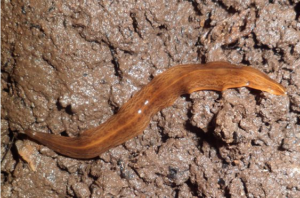Another invasive flatworm arrived from imported pot plants
Why we import plants is beyond me when we have plant breeders and nurseries here? Trade like this has once again let us and our wildlife down. It poses yet another threat to our wildlife, even though they are earthworms. Earthworms make the soil in which we grow our food! Soil is the roof over the factory of life, powered by earthworms and microbes.
Brazilian worm arrived in a pot plant from Europe and preys on snails and earthworms that are essential for soil health

The Obama flatworm (Obama nungara) is native to South America but has spread through Europe to the UK via the plant trade, say botanists. Photograph: Courtesy of Piterkeo
An invasive flatworm from Brazil that poses a threat to soil health and wildlife has made its way to mainland Britain.
A 4.5cm Obama flatworm (Obama nungara) – not linked to the US president but named after the Brazilian Tupi words for leaf (oba) and animal (ma) – was discovered this summer crawling out of a Heuchera plant imported from the Netherlands at a garden centre in Oxfordshire.
Conservationists say this is the “smoking gun” which provides the direct link between the “virtually uncontrolled” trade in pot plants and the spread of invasive species.
The worm, which has a broad, flattened, leaf-shaped body and can grow up to 7cm long, was first found in Europe on Guernsey in 2008 but has spread to France, Italy and Spain. It was only described as a new species last year.
Populations of New Zealand and Australian flatworms are already established in the UK and there are at least 18 flatworms that have been introduced in Europe, including the New Guinea flatworm, listed as one of the 100 worst invasive alien species in the world.
Flatworms prey on earthworms and land snails, and in areas where they have already colonised the soil they have reduced some earthworm populations by 20%.
These invertebrates are considered essential for soil health as they aerate and fertilise the earth, maintain its structure and support plant growth. Fewer invertebrates would also have an impact higher up the food chain, while the resulting poorer quality soil could have knock-on effects on everything from flooding – making the soil less able to absorb water – to farming – where crops would be harder to grow.
“The importation of pot plants into the UK is bringing with it an avalanche of harmful and unwanted species. At Buglife we are regularly alerted to exotic grasshoppers, wasps, beetles, spiders and moths arriving at nurseries and garden centres, many of these animals have the potential to damage agriculture, destroy wildlife or distress gardeners,” said Matt Shardlow, Buglife CEO.
“Our biosecurity is feeble, it is time for the government to take control of this problem before it gets completely out of hand and we are unable to recognise the wildlife in our own gardens.”
Current government guidance for importing trees and plants to England and Wales from the EU requires certain species to carry a “plant passport” or be declared. But Shardlow said for the vast majority of plants there are no biosecurity measures to exclude or check for eggs or hibernating animals in the soil.
There has been an increasing volume and speed of movement of plants in recent years and this increases the chances of exotic pests arriving with imported goods and travellers.
Other stresses such as climate change and changes in land use have increased the risk of invasive species establishing themselves and spreading. The discovery of ash dieback in England in 2012 highlighted the risk posed to the UK’s plants from new pests and diseases. Imports were banned and an independent taskforce set up to assess the threats.
Among the other invasive species that are likely to have arrived through the pot plant trade are the rosemary leaf-beetle, Spanish slug, oak processionary moth, Asian hornet and harlequin ladybird.
Figures show that the UK imports £324m worth of live ornamental plants each year, while invasive species are estimated to cost the British economy around £1.7bn a year.
Trevor Dines, botanical specialist at Plantlife, said: “With thousands of species arriving from around the world the main threats actually are plants themselves. While bans have now been placed on the sale of highly invasive species, we import thousands of others that pose a serious risk.
“Without any screening in place we’re playing a game of Russian roulette with our countryside and native wildlife. The current guidance is utterly inadequate and without rigorous screening it’s not surprising that new invasive plants – and their alarming hitchhikers like the Obama flatworm – are arriving.”
Original article from the Guardian
Research paper here The true identity of Obama (Platyhelminthes: Geoplanidae) flatworm spreading across Europe
Read this interesting article here from Buglife

Recent Comments